Bios: Famous Realists Throughout the Ages
Thucydides
Richelieu
Machiavelli
Hobbes
Bismarck
Lenin
Kissinger
![]()
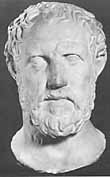
Thucydides
The spiritual father of Realpolitik, Thucydides is best known as the author of the History of the Peleponnesian War. This book is noted for its accuracy and perceptive analysis of the causes of the war.
back to top
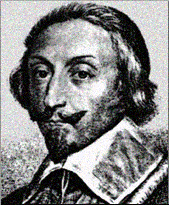
Richelieu
Armand Jean du Plessis, Cardinal, duc de Richelieu, was one of the first theorists and practictioners of the modern school of Realpolitik. Cardinal Richelieu of France is known as the "Father of Realism," as this school of thought is known today; in his day, it was known as "Raison D'Etat." A cardinal in the Catholic Church, Richelieu was revolutionary in his belief that the interests of the state which he served, France, superceded the interests of the church. He therefore joined France in the Thirty Years War on the side of the Protestant forces, rather than with Catholic Austria, and made France the preeminent world power.
back to top

Machiavelli
Perhaps the most (in)famous Realist of them all was Niccolo Machiavelli. Known primarily as the author of "The Prince," he was also a qualified statesman and author of several other texts. As a side note, most Realpolitikers (myself included) don't consider him evil -- just practical.
Niccolo di Bernardo dei Machiavelli was a Florentine diplomat, author, and political theorist. An ardent supporter of the Florentine republic, he was arrested and tortured upon the Medici Restoration in 1513. He wrote Il Principe (The Prince) in 1532 and presented it to the Medici prince as a book of advice. The question remains, however, of why Machiavelli would provide a book of advice to a prince whose rule he opposed and who had caused him to be tortured. For one possible explanation, see Mary G. Dietz's excellent essay, Trapping the Prince: Machiavelli and The Politics of Deception..
back to top
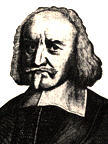
Hobbes
An English philosopher, Thomas Hobbes was born as the Spanish Armada approached England, prompting him later to say, "fear and I were born twins." He lived through the English Civil War, and this left a lasting impression on him and his work. Most of his philosophy reflects his belief in the need for a strong authority to avoid anarchy such as that generated by the English Civil War. He is most famous for his description of the "state of nature: "In such condition, there is no place for industry, because the fruit thereof is uncertain; and consequently no culture of the earth, no navigation, nor use of the commodities that may be imported by sea; no commodious building, no instruments of moving and removing such things as require much force; no knowledge of the face of the earth, no account of time, no arts, no letters, no society; and which is worst of all, continual fear and danger of violent death; and the life of people, solitary, poor, nasty, brutish, and short."
I have included him in this list because of his view on the international system. Hobbes asserts that without a presiding government to legislate codes of conduct, no morality or justice can exist: "Where there is no common Power, there is no Law: where no Law, no Injustice if there be no Power erected, or not great enough for our security; every man will and may lawfully rely on his own strength and art, for caution against all other men." (Hobbes, Leviathan, Part I, Ch.13 'Of Man', and Part II, Ch.17, 'Of Commonwealth').
For his views on international society and the need for a strong monarch, Leviathan is the most useful. For his views on the nature of civil society, read De Cive.
back to top
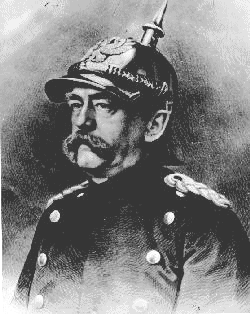
Bismarck
My favorite Realpolitiker is the man who led Prussia to the helm of a united Germany in 1871 and singlehandedly created a state that would dominate world politics for the rest of the century -- Otto Von Bismarck, the "Iron Chancellor."
Otto Eduard Leopold, Fürst von Bismarck is probably the only man in history to truly master Karl Von Clauswitz's precepts for war as a tool of statecraft -- which is what war should be. He led Prussia, first under Kaiser Wilhelm I and then under his son Wilhelm II, to German unification, thus propelling his state into the greatest power in Europe.
back to top
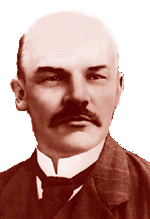
Lenin
Lenin?! Lenin, the Marxist philosopher? Lenin, the man whose brainchild, the Russian Revolution, sought and failed to apply an idealistic political philosophy not only to Russia, but to the rest of the world? Yes, Lenin. Although Vladimir Ilyanovich Lenin sought goals no true Realpolitiker would seek, it was the way he sought them that made him a Realpolitiker. He was willing to get his hands dirty to achieve his goals-- as he put it, "you cannot make a revolution in white gloves."
back to top
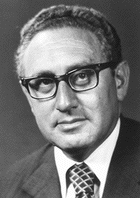
Kissinger
Henry Kissinger, once a professor, served first as National Security Advisor and then as Secretary of State to President Richard Nixon. His statecraft closely resembles that of Otto Von Bismarck. Through the use of his innovative "shuttle diplomacy," Kissinger managed to secure the closest that the Middle East has seen to true peace since the beginning of the Second World War, despite (or perhaps because of) his identity as a Jew. Kissinger is perhaps the only Secretary of State in recent history to refuse to tie the U.S. to Israel, to the exclusion of close relations with other states in the region.
back to top
© 1997 schoonma@financialtech.com
![]()
